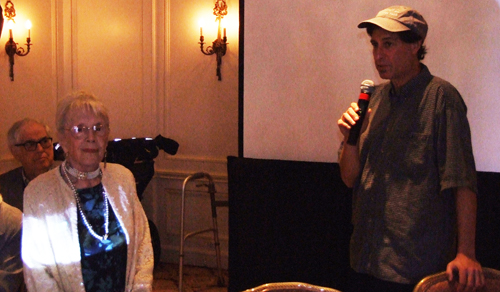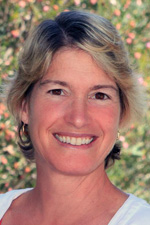
By Eva Trieger

SAN DIEGO — I knew that he was an amazing klezmer musician, playwright, photographer, and historian, but what I did not know about Yale Strom was that he was also a filmmaker! I don’t know how I could have missed this given that he sold his first film, At the Crosswords, to the Learning Channel and continued on as a workshop leader for the past decade and one half. This year’s San Diego Jewish Film Festival will give viewers the opportunity to see Strom’s meticulously crafted documentary A Letter to Wedgewood: The Life of Gabriella Harstein-Auspitz.
In a phone interview I asked Strom if he was aware of this particular piece of history during which Munkacs, a Czechoslovakian-Hungarian town, overtaken by Nazis, was used as a conduit to the death camps. He told me that although he knew of the deportation of Jews from Munkacs, he was unaware of the divisiveness between the Chassidim and the Zionists.
Yale’s father, David Strom, who had been working on memoirs, introduced Gabriella to Yale because she “wants to make a documentary.” Using archival footage and photographs the project focuses largely on Gabriella’s experiences in Munkacs, describing how, as a school girl in the 20s, she was selected to present a visiting British Member of Parliament, with a bouquet of flowers. Hartstein-Auspitz still resides in San Diego, having recently celebrated her 100th birthday.
Josiah Wedgewood arrived in the Hungarian city to assess the political climate. Upon seeing this teary little girl, the Englishman, took her in his arms and quelled her tumultuous emotions. This kindness and rachmonas stayed with Gabriella and Wedgwood’s name and face were emblazoned in her young mind.
In 1938, Hungary struck a deal with the Nazis, and Munkacs was handed over to the Germans. By this time, Gabriella was a teacher in this center of Jewish learning, and she had begun to dream about living in Israel. Her father, a rabbi, had raised his family to be staunch Zionists, and Gabriella told Strom that she harbored a lifelong dream of living in Palestine.
The writing was on the wall, and life became increasingly restrictive for Eastern European Jews, including Gabriella and her brother. Recalling the kindness of Josiah Wedgwood, the young woman, wrote a letter to her white knight, asking him to arrange for her passage to Palestine. “Gabriella has a lot of chutzpah. She is forthright, and she had nothing to lose. She believed strongly and was tenacious,” Strom said of Gabriella’s actions. Wedgwood was unable to deliver on this bold request, but incredibly, he did arrange for her to become a resident at his summer home, where she lived out the rest of the war in relative safety, escaping the demise of her family at the hands of Nazis.
The degree of compassion and desperation are paramount in this film, but A Letter to Wedgwood is not only the story of Gabriella Hartstein Auspitz’ incredible experience. The documentary demonstrates the Zionists’ struggle, and illustrates the tug of war between Chassidim and Zionists. Eliezer Shapiro, the Munkatcher Rebbe and leader of the Munkatcher Chasidic sect in the Carpathian region, believed the Zionists were overstepping their bounds by creating Israel before the Messiah had done so. Chassidim wanted to keep Hebrew sacred and holy, separate, while Zionists, such as Gabriella, chose it as the lingua franca.
Further, the documentary reveals that the Hungarian takeover was anything but benign, when they joined the Allies in 1944. When Hitler learned of this he ordered an invasion of Hungary. This resulted in Hungarian Jews being subjected to many anti-Jewish laws, and many ended up in extermination camps such as Auschwitz. A year later the region fell under Russian rule. More than 500,000 Hungarian Jews had been brutally dispatched.
Strom’s film seeks to unveil egregious behavior on the part of the British. Certainly Germany has been considered culpable for devastation of Jews, Romas Communists and homosexuals, but A Letter to Wedgwood also reveals that through these “White Papers,” with stringent quotas, Britain made it illegal for Jews to return “home”, causing the loss of one quarter million Jewish lives. The very country that had made a homeland possible was now issuing unconscionable limits to the very people it was intended to serve.
So many of our ancestors who were born in Austria-Hungary became Czechoslovakian in wartime. Then, they became the property of Hungary, eventually fell to Russian control and ended up in the Ukraine, in the ever changing political landscape, and interminable power grab. At every step of this hopeless downward spiral, Jews were involved. Not just involved, but central characters. Many of the major players were Enlightened Jews. They all came from the culturally steeped soil of this region of Europe, where repeated indignities and assaults have been delivered with few reprieves.
Elie Wiesel, the prolific writer, as well as the Baal Shem Tov, came from the “old Jewish shtetl world.” Theodore Herzl, and Chaim Weitzmann were staunch supporters of the Jewish state, and worked tirelessly to mitigate the British sanctions. These writers, statesmen and philosophers shaped much of what we know today about Judaism, ethics and perseverance.
Yale Strom’s documentary film will be featured on Tuesday, February 10 at 2:00 pm. Strom has many feathers in his cap, but the most recent is that he was nominated as one of the ten recipients of the Creative catalyst grant for 2015. Yasher Koach! Additionally, San Diego State University will showcase “Jews in Latin Music” on April 22nd at 7 pm in Smith Hall.
Tickets are available: www.sdjcc.org or by phone 858.362.1348
*
Trieger is a freelance writer specializing in the arts. Your comment may be placed in the space provided below or sent to eva.trieger@sdjewishworld.com
In addition to the Jews, gypsies, Communists and homosexuals, killed it would help if it said During WW2 Germans killed 2.7 million Polish Jews . killed 3 milion Poles , kidnapped 200 thousand Polish children , ordered 3.1 million Poles to forced labour in Germany